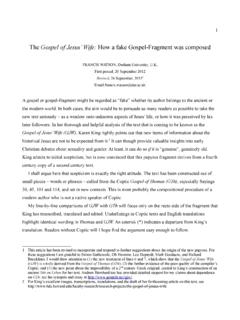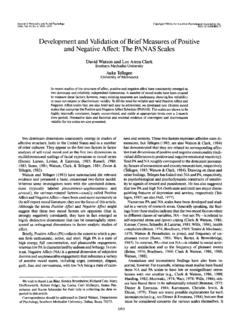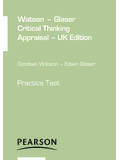Transcription of Catawba Indian Genealogy - Ian Watson's Web Site
1 CatawbaIndianGenealogyIan WatsonThe Geneseo Foundationandthe Department of Anthropology, State University of New York at Geneseo1995 PAPERS IN ANTHROPOLOGYD epartment of AnthropologyState University of New York at GeneseoGeneseo, New York 14454 Series Editor: Russell A. JudkinsNumber 4 Catawba Indian GenealogyCopyright Ian Watson1995 ISBN 0-9617915-3-5 This PDF edition was produced in February 2004. It is identical to the 1995printed version in content except for a few minor typographical andformatting corrections. The overall pagination is the same, but a few pagebreaks occur at slightly different points due to a difference in the size of thefont used for footnotes and very few additional printed copies of this book are still available for $20postpaid from the Department of Anthropology, SUNY Geneseo, Geneseo, 14454.
2 Checks should be made payable to the Geneseo PUBLICATIONS IN THIS SERIESI roquois Studies: A Guide to Documentary and Ethnographic Resources fromWestern New York and the Genesee Valley (1987)First International Scholars Conference on Cambodia: Selected Papers (1988)Handbook for Archival Research in the Dr. Charles E. Bartlett IroquoisCollection (1989)ContentsEDITOR S Indian history of Catawba genealogical record (I) Early and miscellaneous (II) David (III) Allen (IV) Absalom ( Epp ) (V) Lucinda (Screech Owl).. Catawbas and the marriage in Catawba genealogical Genealogy and American the reliability of oral Revolutionary paylist of Catawba petition of Catawba census of s 1853 list of cemetery 1943 tribal s NoteIan Watson's Catawba Indian Genealogy will prove to be a valued andprecious contribution to Native American genealogical studies as well as toCatawba Indian anthropology and history.
3 It helps restore to our knowledgeof the Catawba the faces and the families the real people who carried onthe Catawba world during the nineteenth and early twentieth his genealogical work, the received picture of a generic, dwindling,remnant Catawba tribe is transformed to actual people - persons in specificplaces and times, living Catawba lives in specific work had its beginnings in highly skilled and competentgenealogical research assistance which Mr. watson provided for Catawbaresearch of mine. It grew into his own, independent research and scholarlycontribution, which the Geneseo Foundation and the AnthropologyDepartment at SUNY Geneseo are pleased to publish in this watson is a graduate of Harvard University, with a degree inScandinavian linguistics.
4 He has written and edited travel guidebooks to anumber of European countries and has most recently worked in internationalInternet A. JudkinsSeries EditorForewordWhen Ian watson contacted me ten years ago to discuss his work onCatawba Genealogy , I must confess that I was skeptical. Having studied theCatawba records myself, I doubted that anyone could penetrate the thicket oftantalizing but scattered and difficult sources on Catawba life in order toreconstruct family histories. Then, when I learned that Mr. watson was justsixteen and that he planned to do the Genealogy in a single summer, myskepticism only results of his work, presented here in revised and somewhatexpanded form, quickly laid my doubts to rest.
5 Catawba Indian Genealogy isan impressive achievement. Piecing together fragmentary sources, IanWatson has crafted a study that succeeds on several levels. Most obviously,it brings into the light hitherto shadowy Catawba family histories over thepast two centuries. But then it goes beyond that painstaking task to considerwhat these family connections can reveal about marriage patterns, namingpractices, and the uses of oral history. Meanwhile it generously (andcorrectly) points out that, for all of the ground covered here, many sourcesthat will shed further light on the Catawba past remain unexploited bygenealogists, an enticing prospect indeed. Nor is the success of this workrestricted to Catawbas and their students.
6 In addition, watson s studystands as testimony that no group, however hidden from the more obviousforms of documentation, is truly hidden from a determined and imaginativeresearcher, a finding that will hearten those interested in other groups longthought to be lost or forgotten. Finally watson raises the whole question ofwhether genealogical codes and techniques established for Euroamericanfamilies can even be applied to American Indian peoples. Careful in itsconstruction, ambitious in its scope, generous in its spirit, yet with a healthyskepticism about the difficulties inherent in applying alien customs ofthought and behavior, Catawba Indian Genealogy makes a valuable additionto the efforts of scholars to listen for the voices of those historically H.
7 MerrellLucy Maynard Salmon Professor of HistoryVassar CollegePrefaceThis monograph was originally written in 1986. The previous year I hadbegun working for Russell Judkins, of the Department of Anthropology at theState University of New York at Geneseo, as a research assistant. From myown work on my family history I had become a skilled genealogist; needed help tracking the family lines of the Catawba indians whomigrated to New Mexico and Colorado in the late 1800s. I had great luckanswering his questions with simple census searches. Inspired by thissuccess, I conceived, applied for, and received a stipend from the YoungerScholars program of the National Endowment for the Humanities (grant FI-20730-86) to spend the summer of 1986 compiling a complete Genealogy ofthe entire Catawba Indian tribe.
8 This was the summer I was sixteen research program involved a thorough trawl through secondarysources and census records, and then a trip south. In Columbia I worked atthe South Caroliniana Library of the University of South Carolina and at theSouth Carolina Department of Archives and History. In Rock Hill, I workedat the York County Library, the Winthrop College Library, and on theReservation. In Washington, I worked at the National Archives and at theNational Anthropological Archives in the Smithsonian Institution. I made acard index covering the entire tribe, and drew up preliminary genealogicalcharts of each family. The better part of July, August, and September Ispent compiling and writing up the family sketches and commentary thatappear in this volume.
9 Unfortunately, I was only able to complete compiledgenealogies for a little over half the families in the tribe. My final report,submitted in September, left out major families such as Ayres, Canty,George, Kegg, Mursh, Sanders, Scott, Timms, Watts, and White. Later thatfall I was able to finish the Kegg and Sanders sketches, as well as partialsketches of the Canty and Mursh families. These are printed here for thefirst I wrote was well received, and for years afterward I hoped toreturn to the data and finish my work. I was frustrated by the fact that newsource material on the tribe had surfaced after the summer of 1986, and to doit justice I would have had not only to write up the remaining families but torevise what I had already written extensively and painstakingly.
10 Moreimportantly, I had no personal investment in Catawba Genealogy , and nosource of funding for any more research, and during college I gave up myinterest in American social history in favor of Scandinavian , hand problems left me unable to type much, and reconciled me toacknowledging that I didn t want to complete the project and ought to find ahome for my Catawba manuscripts. The South Caroliniana Library waseager to house my papers, while Russell Judkins suggested finally publishingwhat I had hope that some young Catawba , as part of an academic project andwith funding perhaps from the tribe, will be able to extend the work that Ihave done. A complete Catawba Genealogy would be a satisfying andencompassable project, and there would be surprising joy and beauty in doingit.



